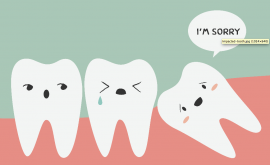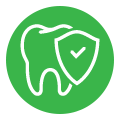Sometimes it is necessary to have a tooth or teeth removed. This can be for a variety of reasons ranging from overcrowding, tooth decay, gum disease, a broken tooth or impacted wisdom teeth. These problems can cause increasing pain, bad breath and be unsightly if not treated.
Generally we can carry out the procedure in the surgery, but if necessary, we may refer you for a hospital admission.
Depending on your teeth and needs, your extraction could take one appointment or a few sessions. You can discuss this with us in advance, or if you are in for an emergency ‘get me out of pain’ appointment you may decide to have a tooth extracted there and then.
We can also advise you on your wisdom teeth if they are giving you problems.
Please be assured that we will always work with you when extracting a tooth. Let us know if you’re nervous and we’ll ensure that we help you as much as possible and give you the time you need to relax.
To fill the gap where your tooth once was, there are a number of options that you may like to consider such as dental implants, a bridge or dentures. Our dentists will be happy to give you advice on the options, the pros and cons, and the relative costs.
Please read the advice below for what to do, and not to do, after having your tooth extracted.
Take it easy for the rest of the day. Rest as much as you can and don't exercise.
When resting, keep your head up and, for the first night using an extra pillow if possible. It is also a good idea to use an old pillowcase, or put a towel on the pillow, in case you bleed a little.
Avoid hot food or drinks until the anaesthetic wears off. This is important as you cannot feel pain properly and may scald your mouth. Also be careful not to chew your cheek. This is quite a common problem, which can happen when there is no feeling.
Avoid alcohol for at least 24 hours, as this can encourage bleeding and delay healing. Eat and drink lukewarm food as normal but avoid chewing on that area of your mouth.
Avoid eating on that side or letting your tongue disturb it. This can allow infection into the socket and affect healing.
If you are a smoker, try to avoid smoking for at least a day.
Do not be tempted to rinse the area for the first 24 hours. It is important to allow the socket to heal, and you must be careful not to damage the blood clot.
It is important to keep your mouth clean after an extraction. However, you do need to be careful around the extraction site. Brush carefully.
Some slight bleeding in the first day or so is normal. A small amount of blood mixed with a larger amount of saliva, can look more dramatic than it really is.
If you do notice bleeding, do not rinse out, but apply pressure to the socket. Bite firmly on a folded piece of clean cotton material such as a handkerchief for at least 15 minutes. Make sure this is placed directly over the extraction site and that the pad is replaced if necessary.
If the bleeding has not stopped after an hour or two, please get in touch with us.
After the first 24 hours, you can gently rinse with a teaspoon of salt in a glass of warm water twice a day to help to clean and heal the area. We recommend continuing this for at least a week.
It is important to have a healthy diet and possibly take a Vitamin C supplement to help your mouth to heal.
There will usually be some tenderness in the area for the first few days, and in most cases some simple pain relief is enough to ease the discomfort. What you would normally take for a headache should be enough, but do not take aspirin as this can lead to bleeding.
Occasionally, an infection can get in the socket and cause pain. If you are getting a lot of pain, it is important to see your dentist, who may place a dressing in the socket and prescribe a course of antibiotics to help relieve the infection. You may also feel the sharp edge of the socket with your tongue and sometimes small pieces of bone may work their way to the surface of the socket. This is perfectly normal.




